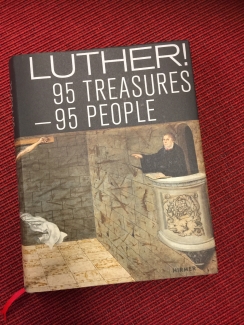Luther och Bergman
I år är det Lutheråret, 500 år efter att de 95 testerna spikades upp av Martin Luther på Wittenbergs kyrkport, vilket uppmärksammas världen över med olika arrangemang. Ingmar Bergman har ansetts vara en ”protestantisk ateist”, men oavsett om han var troende eller inte så är hans arbete djupt rotat i en kristen och framförallt luthersk tradition.
I Tyskland har utställningen Luther! 95 Treasures - 95 People, och en bok med samma namn, producerats.
Jan Holmberg, vd för Stiftelsen Ingmar Bergman, har bidragit med en text om Ingmar Bergman:
Ingmar Bergman
Film Director, Sweden, 1918–2007
‘I believe a human being carries his or her own holiness, which lies within the realm of the earth; there are no otherworldly explanations.’
To the extent that western filmmakers express a religious faith at all, Catholics seem to be somewhat overrepresented (Bresson, Ford, Hitchcock, Rohmer, Scorsese etc.). Important Protestant filmmakers appear to be fewer in number. In fact, their only truly famous representative is Ingmar Bergman. I will refrain from speculating whether this is merely a coincidence or whether it reflects differing theological views on the image. However, notwithstanding Ingmar Bergman’s powerful and highly influential imagery, I would claim that his cinema is deeply rooted in the written word, indicative of his Protestant upbringing. Sola scriptura is a central Lutheran idea and in his screenplays and other books, diaries, and many letters, Bergman seems to have taken this ad notam. Indeed, Bergman’s adversaries have often criticised his films as being too ‘literary’.
The facts are briefly these: the son of a clergyman, Bergman grew up in a milieu where churchgoing, sermons and various religious services abounded. That many of his films deal with theological questions is something of an understatement and is reflected, not least, in the fact that several of their titles are direct quotations from the Bible. One of these, The Seventh Seal (1957), earned Ingmar Bergman the status of cinema’s religious philosopher par excellence. Another Bible-quoting title, Through a Glass Darkly(1961), was the first film in his so-called ‘trilogy on the silence of God’. At the end of the film, a father and his son are shown talking together, clearly for the first time in a long time. When the son declares that it is impossible to believe in God, the father replies that love is proof of God’s existence.
St John’s assertion that ‘God is Love’, echoed by St Paul in his Corinthians 1, from which the title of the film is taken, can also be understood in reverse: if God is absent or silent, it is because there is no love – without love, no God. A variation on the same theological theme is the subject of Bergman’s next film Winter Light (1963). Here, a clergyman is beset by doubt. His liturgical duties are reduced to empty rituals and the pastoral care he offers to the members of his congregation takes the form of inept introspection. In the final scene of the film he is about to hold a service. But only one person has turned up – his mistress, moreover an overt atheist. To the cantor’s and churchwarden’s surprise, the pastor declares that the service will go ahead regardless, and the film ends with him addressing the empty pews: ‘Holy, holy, holy is the Lord God Almighty. Heaven and earth are filled with his glory.’
This is a very Bergmanesque ending. Given the horrific things that have happened during the course of the film, the closing lines seem deeply ironic. Where is the glory of which the pastor speaks? Yet the new expression on his face suggests that now, and for the first time, he actually believes what he is saying.
Bergman has been referred to as a ‘Protestant atheist’, but whether he believed or not, his work is undoubtedly deeply rooted in a Christian and specifically Lutheran tradition.
/Jan Holmberg
For further reading:
Ingmar Bergman: Bilder, Köln 1991.
Im Bleistift-Ton: Ein Werk-Porträt, hrsg. von Renate Bleibtreu, Frankfurt a. M. 2002.
Wahre Lügen: Bergman inszeniert Bergman, hrsg. von Kristina Jaspers, Nils Warnecke und Rüdiger Zill, Berlin 2012.
